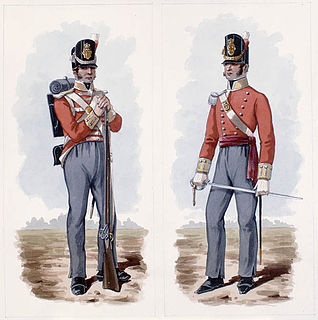This page is based on this
Wikipedia article Text is available under the
CC BY-SA 4.0 license; additional terms may apply.
Images, videos and audio are available under their respective licenses.
100th Regiment of Foot may refer to regiments of the British Army:
The 64th Regiment of Foot was an infantry regiment of the British Army. The regiment was created as the 2nd Battalion, 11th Regiment of Foot in 1756, redesignated as the 64th Regiment of Foot in 1758, and took a county title as the 64th Regiment of Foot in 1782. Following the Cardwell Reforms the regiment amalgamated with the 98th Regiment of Foot to become The Prince of Wales's in 1881. In the new regiment the 64th Foot became the 1st Battalion due to its seniority over the 98th Foot.

The 46th Regiment of Foot was an infantry regiment of the British Army, raised in 1741. Under the Childers Reforms it amalgamated with the 32nd (Cornwall) Regiment of Foot to form the Duke of Cornwall's Light Infantry in 1881, becoming the 2nd Battalion of the new regiment.
The 82nd Regiment of Foot was an infantry regiment of the British Army, raised in 1793. Under the Childers Reforms it amalgamated with the 40th Regiment of Foot to form the Prince of Wales's Volunteers in 1881.
Six regiments of the British Army have been numbered the 99th Regiment of Foot:
Four regiments of the British Army have been numbered the 75th Regiment of Foot:

The 87th Regiment of Foot was an infantry regiment of the British Army, raised in 1793. Under the Childers Reforms it amalgamated with the 89th Regiment of Foot to form the Princess Victoria's in 1881.
The 109th Regiment of Foot was an infantry regiment of the British Army from 1862 to 1881, when it was amalgamated into The Prince of Wales's Leinster Regiment.

The 100th Regiment of Foot was a British Army, raised in 1858. Under the Childers Reforms it amalgamated with the 109th Regiment of Foot to form the Prince of Wales's Leinster Regiment in 1881.

The 100th Regiment of Foot was raised in Ireland in 1804 for service in the Napoleonic Wars. After a few weeks, Lieutenant Colonel John Murray was appointed to command; he was to remain in this post for most of the regiment's active service.
The 109th Regiment of Foot was an infantry regiment of the British Army from 1761 to 1763.

The 49th (Hertfordshire) Regiment of Foot was a line infantry regiment of the British Army, raised in 1743. Under the Childers Reforms it amalgamated with the 66th (Berkshire) Regiment of Foot to form the Princess Charlotte of Wales's in 1881.
Six regiments of the British Army have been numbered the 97th Regiment of Foot:
Six regiments of the British Army have been numbered the 96th Regiment of Foot:
The 96th Regiment of Foot was the fourth light infantry regiment of the British Army to bear this name. It was originally created from the 2nd Battalion of the 52nd Regiment of Foot in 1803 at the start of the Napoleonic Wars. Initially a single battalion regiment, a second battalion was raised in 1804. The Regiment was based mainly in the Caribbean and on Jersey and renumbered as the 95th Regiment of Foot. Following the defeat of Napoleon, the British army was reduced in size, and the regiment was disbanded in 1818.




